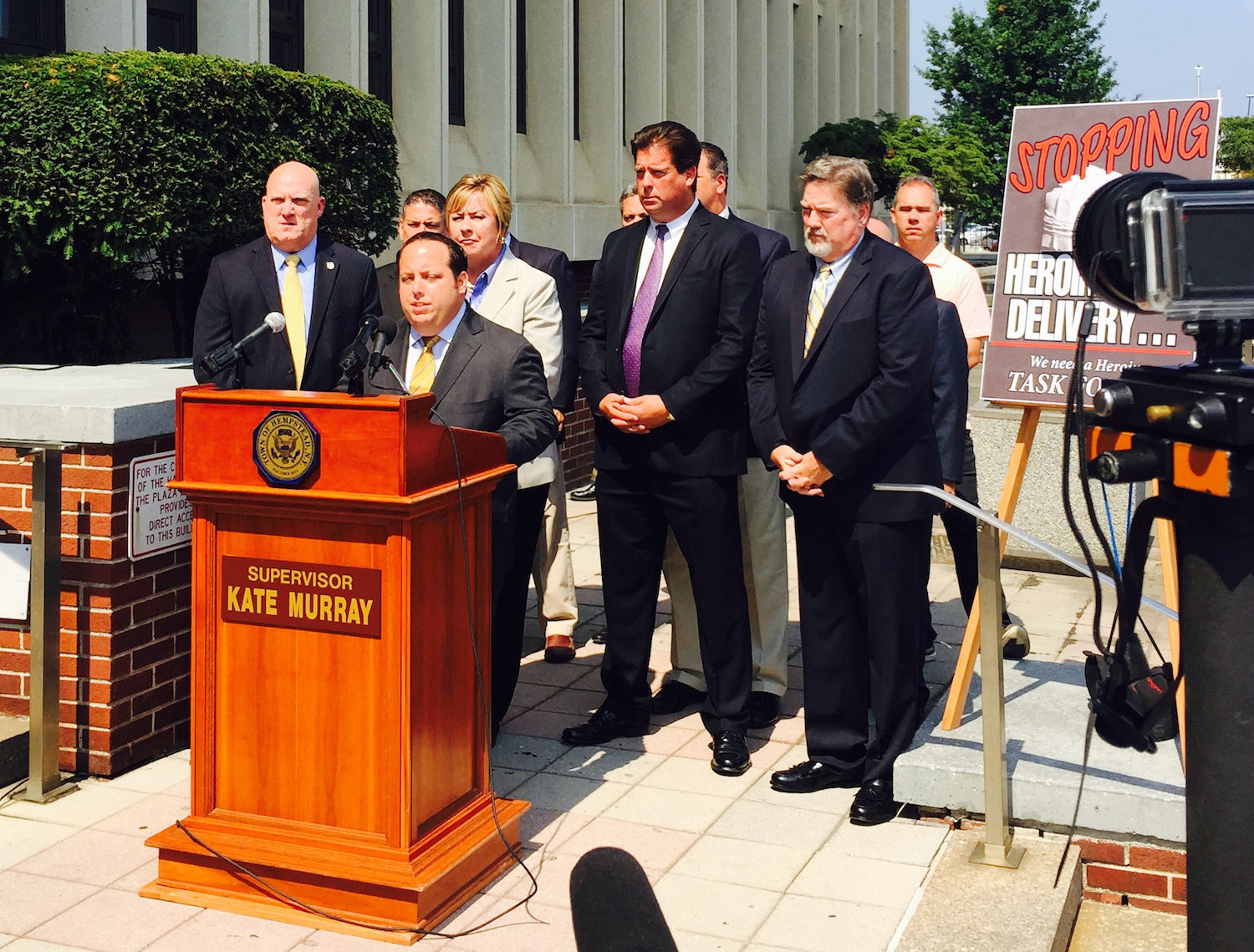Warren Zysman said he was not surprised by a recent report that found fatal heroin overdoses had doubled in the past year – from 18 to 36.
Zysman, a lifelong Great Neck resident, said his job as chief executive officer and chief program officer of the Addiction Care Interventions Chemical Dependency Treatment Centers in Manhattan offers him a clear picture of the heroin problem in Nassau County.
“You would be shocked to see how many people come from Long Island. I would say around 25 to 30 percent are from Long Island,” Zysman said. “And most of them are young people.”
On Sept. 1, Zysman joined Hempstead Town Supervisor Kate Murray and Nassau County police officials at a press conference calling for a heroin task force to combat the rising epidemic of heroin abuse in New York, as well as in Nassau County.
Murray, who is opposing Acting Nassau County District Attorney Madeline Singas in the race for district attorney, presented the report on heroin deaths at the news conference.
“This is a huge priority in Nassau County. Getting law enforcement to be involved the way Kate Murray has is important,” said Zysman, who is a Nassau University Medical Center board member and chairman of the board’s Behavioral Health Committee. “Getting law enforcement the help they need to rule out the access to heroin in Long Island is key. She has a plan to success.”
Zysman said a well-developed heroin task force is necessary to prevent a further rise in heroin addiction.
“The plan involves supporting law enforcement, treatment communities, and getting the ingredients you need to cut off access to drugs,” Zysman said. “As well as getting people the access they need for help.”
Currently, the only inpatient drug rehabilitation center in Nassau County is located at the Nassau University Medical Center.
Zysman, who has spent his professional career fighting against drug abuse in New York, was born and raised in Great Neck, attending Saddle Rock Elementary School and then Great Neck South Middle and High School.
After attending Adelphi University and graduating in 2002 with a Bachelor of Social Work, Zysman graduated with a master’s degree in social work with a specialization in substance abuse from Fordham University in 2003.
Addiction Care Interventions Chemical Dependency Treatment Centers, which provide assistance for over 10,000 people each year, according to Zysman, have an outpatient program at 255 W. 36th St., and an inpatient program at 500 W. 57th St.
The outpatient program assists patients with addiction counseling, psychiatry, and provides medication for drug addiction, he said.
Zysman added that the center is one of the only places that accepts insurance for a medicine called Suboxone, which is a low-level opiate that blocks brain receptors to prevent patients from feeling the effects of heroin including withdrawal symptoms.
The Addiction Care Interventions inpatient program helps patients detoxing from alcohol or drug abuse as well as providing a 28-day residential rehabilitation program that Zysman said is like “something you would see in a movie.”
Zysman said he wants to branch out and provide Long Island with more programs fighting against heroine and drug addiction.
“The plan is to branch out into Long Island,” Zysman said. “The point of the task force is to get folks who are involved to be able to have the tools they need to arrest the people bringing the drug in and for treatment providers to get the people who use heroine the help they need.”
In early September, Zysman joined state Sen. Jeff Klein (D-Bronx/Westchester) and other New York City officials in calling for the removal of synthetic marijuana, also called K2, products from online websites like eBay and Craigslist.
Zysman said that K2 is dangerous because it is cheap, legal, and people have easy access to the product.
He added that it has become a gateway drug leading to increased heroine use.
“More people are ready to experiment with drugs because they can get K2 over the counter,” Zysman said. “Then once they do that, they hang out with a crowd that experiments with Oxycodone. When they run out of pills, they find out how expensive it is and see heroin is cheaper.”
Cutting off access both online and in stores would greatly reduce the number of users, Zysman said.
He said that parents play a big role in providing their children help if they are suffering from heroin addiction.
“Parents are horrified to bring them in because they want it to be anything but heroin because of the stigma attached to it,” Zysman said. “Parents are embarrassed to come to terms with their kids being heroin addicts.”
Zysman lives with his wife, Corey Karlin-Zysman, a physician at the Long Island Jewish Medical Center in New Hyde Park, and their five-year-old son and two-year-old daughter.



